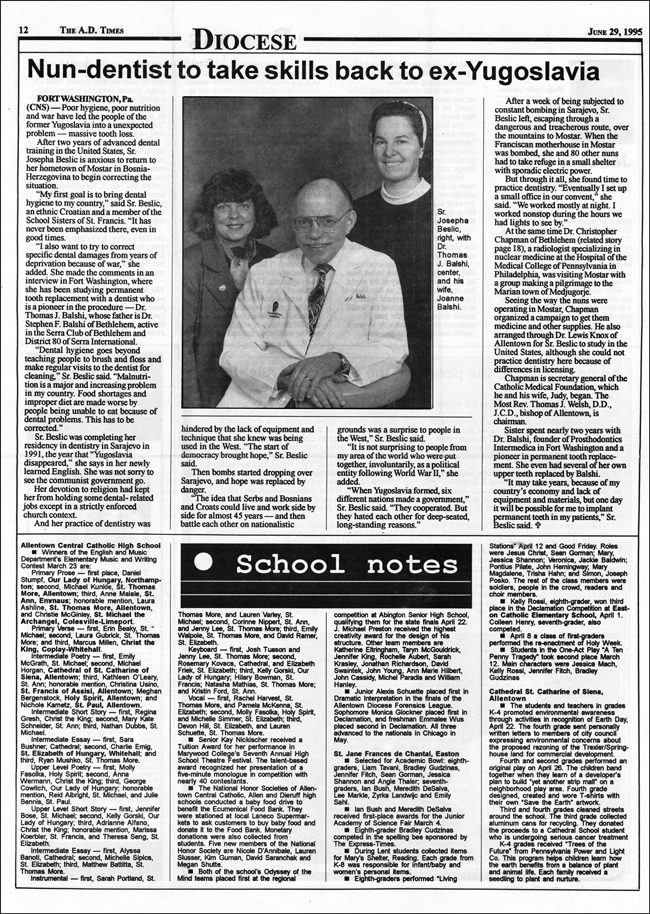June 29, 1995
The Allentown Diocese Times (The A.D. Times)
June 29, 1995
Nun-dentist to take skills aback to ex-Yugoslavia
Fort Washington, PA
(CNS)–Poor hygiene, poor nutrition and war have led the people of the former Yugoslavia into an unexpected problem — massive tooth loss.
After two years of advanced dental training in the United States, Sr. Josepha Beslic is anxious to return to her hometown of Mostar in Bosnia-Herzegovina to begin correcting the situation.
“My first goal is to bring dental hygiene to my country,” said Sr. Beslic, an ethnic Croatian and a member of the School of Sisters of St. Francis. “It has never been emphasized there, even in good times.
“I also want to try to correct specific dental damages from years of deprivation because of war,” she added. She made the comments in an interview in Fort Washington, where she has been studying permanent tooth replacement with a pioneer in the procedure — Dr. Thomas J. Balshi, whose father is Dr. Stephen F. Balshi of Bethlehem, active in the Serra Club of Bethlehem and District 80 of Serra International.
“Dental hygiene goes beyond teaching people to brush and floss and make regular visits to the dentist for cleaning,” Sr. Beslic said. “Malnutrition is a major and increasing problem in my country. Food shortages and improper diet are made worse by people being unable to eat because of dental problems. This has to be corrected.”
Sr. Beslic was completing her residency in dentistry in Sarajevo in 1991, the year that “Yugoslavia disappeared,” she says in her newly learned English. She was not sorry to see the communist government go.
Her devotion to religion had kept her from holding some dental-related jobs except in a strictly enforced church context.
And her practice of dentistry was hindered by the lack of equipment and technique that she knew was being used in the West. “The start of democracy brought hope,” Sr. Beslic said.
Then bombs started dropping over Sarajevo, and hope was replaced by danger.
“The idea that Serbs and Bosnians and Croats could live and work side by side for almost 45 years — and then battle each other on nationalistic grounds was a surprise to people in the West,” Sr. Beslic said.
“It is not surprising to people from my area of the world who were put together involuntarily, as a political entity following World War II,” she added.
“When Yugoslavia formed, six different nations made a government,” Sr. Beslic said. “They cooperated. But they hated each other for deep-seated, long-standing reasons.”
After a week of being subjected to constant bombing in Sarajevo, Sr. Beslic left, escaping through a dangerous and treacherous route, over the mountains of Mostar. When the Franciscan motherhouse in Mostar was bombed, she and 80 other nuns had to take refuge in a small shelter with sporadic electric power.
But through it all, she found time to practice dentistry. “Eventually I set up a small office in our covent,” she said. “We worked mostly at night. I worked nonstop during the hours we had lights to see by.”
At the same time Dr. Christopher Chapman of Bethlehem (related story page 18), a radiologist specializing in nuclear medicine at the Hospital of the Medical College of Pennsylvania in Philadelphia, was visiting Mostar with a group making a pilgrimage to the Marian town of Medjugorje.
Seeing the way the nuns were operating in Mostar, Chapman organized a campaign to get them medicine and other supplies. He also arranged through Dr. Lewis Knox of Allentown for Sr. Beslic to study in the United States, although she could not practice dentistry here because of different licensing.
Chapman is secretary general of the Catholic Medical Foundation, which he and his wife, Judy, began. The most Rev. Thomas J. Welsh, D.D., J.C.D., bishop of Allentown is chairman.
Sister spent nearly two years with Dr. Balshi, founder of Prosthodontics Intermedica in Fort Washington and a pioneer in permanent tooth replacement. She even had several of her own upper teeth replaced by Dr. Balshi.
“It may take years, because of my country’s economy and lack of equipment and materials, but one day it will be possible for me to implant permanent teeth in my patients,” Sr. Beslic said.
